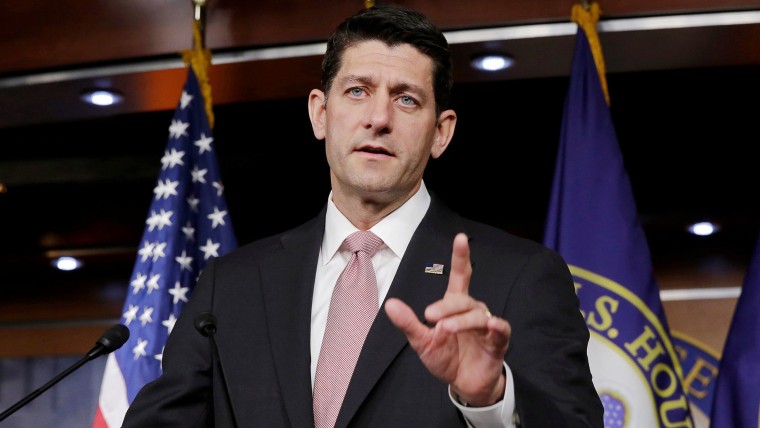For much of the fall, Republicans were eager to argue that Hillary Clinton, if she won the election, should not have a "mandate" to pursue her policy priorities. Now that she's lost, Republicans are eagerly arguing the opposite.
House Speaker Paul Ryan, who spent the past six months carefully navigating the controversial phenomenon of Donald Trump, gave the president-elect credit for a win that defied political odds and helped Republicans down ballot."What Donald Trump just pulled off was an enormous political feat," Ryan said in his hometown of Janesville, Wisconsin, adding that he "just earned a mandate."
At a certain level, I can appreciate the Speaker's argument. It's true that elections have consequences -- whether the outcome is sensible or not -- and Trump has earned an opportunity to govern. Americans put the entirety of the federal government in the hands of radicalized Republicans, and the public should expect certain policy consequences for their collective decision.But the funny thing about Ryan's declaration is that he seems to believe only Republicans can earn a mandate -- and that's not a credible posture to take.Let's back up for a minute to define the term. As we've discussed before, the idea of a "mandate" is based on the notion that a candidate runs on an agenda, gets elected, and earns the right to expect that his or her agenda will be given a shot. After all, the argument goes, the candidate was chosen by the American electorate, and if voters endorsed his or her platform, democratic principles demand that policymakers pursue that agenda.But in Trump's case, it's a little more complicated than that.First, while the Republican obviously won the election, he also lost the popular vote. In other words, the nation was given a choice and more Americans chose Hillary Clinton. I'm not saying that undermines Trump's legitimacy -- we have an electoral-college system, for good or ill -- but it does undermine Paul Ryan's claims that voters handed Trump a mandate.Second, the whole idea of a mandate applies to policy agendas, and by any fair metric, Donald Trump didn't really have one. Indeed, the president-elect went out of his way during the campaign to reject substance and policy details, and he routinely took multiple sides to multiple issues. It's hardly the stuff mandates are made of.But even putting this aside, four years ago this week, Paul Ryan was asked, "Does Barack Obama now have a mandate?" The Wisconsin congressman replied, "I don't think so."Remember, Obama had just won a second term with relative ease. He not only won the popular vote, he became one of only six presidents in American history to top 51% of the popular vote twice. In Paul Ryan's mind, however, Obama didn't earn a mandate, while Donald Trump, who received fewer votes than the Democrat, did.It's almost as if Republicans are playing some kind of "heads I win, tails you lose" sort of game and Ryan's so-called principles shouldn't be taken seriously.
